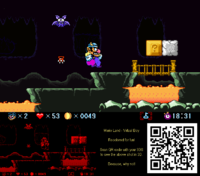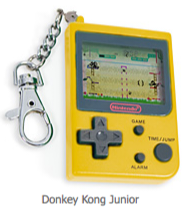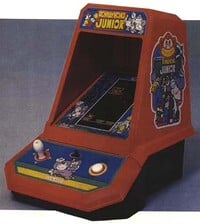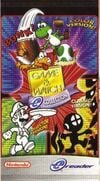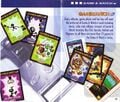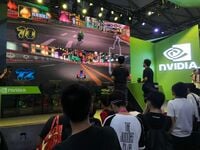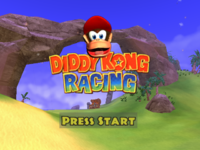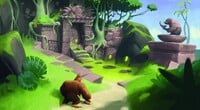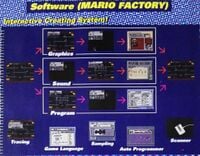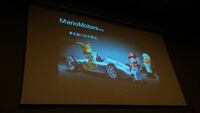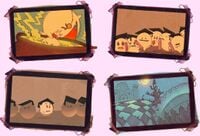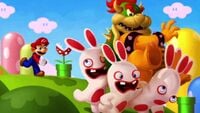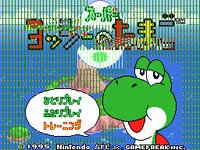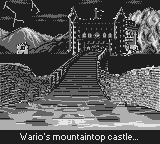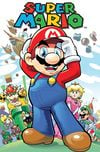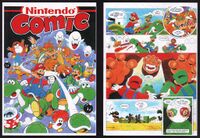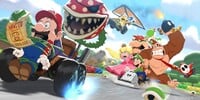List of unreleased media: Difference between revisions
Tags: Mobile edit Advanced mobile edit |
|||
| Line 241: | Line 241: | ||
====''Mario Factory''==== | ====''Mario Factory''==== | ||
[[File:Mario Factory.jpg|thumb]] | [[File:Mario Factory.jpg|thumb]] | ||
In 1994, a Nintendo patent was created for a device that could create basic games for the SNES, likely intended for use in schools.<ref>{{cite|url=patents.google.com/patent/US6115036?oq=inassignee:"Nintendo+Co+Ltd"|title= Video game/videographics program editing apparatus with program halt and data transfer features|publisher=Google Patents|accessdate=May 27, 2024}}</ref> The program for creating said games was titled '''''Mario Factory''''', and featured loose adaptions of the ''Super Mario'' characters.<ref>{{cite|url=patentimages.storage.googleapis.com/4b/1a/bf/29a5fe6c45bf11/US6115036-drawings-page-9.png|title=''Mario Factory'' image|publisher=Google Patents|accessdate=May 27, 2024}}</ref> It is known that the patented machine itself had been released in Japan at some point, being used with the "Game Processor RAM Cassette".<ref>{{cite|url=x.com/luigiblood/status/1109479153747804160|title=Do you guys remember the Mario Factory patent? <nowiki>https://</nowiki>patents.google.com/patent/US6115036A/en Well thanks to the recent Satellaview uploads: We know it exists in some shape or form, it was called the "Game Processor". It makes games for the SNES.|date=March 23, 2019|publisher=X|accessdate=May 27, 2024}}</ref> It is possible that ''Mario Factory'' was actually completed and used for this machine, but nothing has ever proved this, and it may have been a non-''Super Mario''-branded software in the final product. This is unrelated to the Mario Factory arcade center in Japan. | In 1994, a Nintendo patent was created for a device that could create basic games for the SNES, likely intended for use in schools.<ref>{{cite|url=patents.google.com/patent/US6115036?oq=inassignee:"Nintendo+Co+Ltd"|title= Video game/videographics program editing apparatus with program halt and data transfer features|publisher=Google Patents|accessdate=May 27, 2024}}</ref> The program for creating said games was titled '''''Mario Factory''''', and featured loose adaptions of the ''Super Mario'' characters.<ref>{{cite|url=patentimages.storage.googleapis.com/4b/1a/bf/29a5fe6c45bf11/US6115036-drawings-page-9.png|title=''Mario Factory'' image|publisher=Google Patents|accessdate=May 27, 2024}}</ref> It is known that the patented machine itself had been released in Japan at some point, being used with the "Game Processor RAM Cassette".<ref>{{cite|url=x.com/luigiblood/status/1109479153747804160|title=Do you guys remember the Mario Factory patent? <nowiki>https://</nowiki>patents.google.com/patent/US6115036A/en Well thanks to the recent Satellaview uploads: We know it exists in some shape or form, it was called the "Game Processor". It makes games for the SNES.|date=March 23, 2019|publisher=X|accessdate=May 27, 2024}}</ref> It is possible that ''Mario Factory'' was actually completed and used for this machine, but nothing has ever proved this, and it may have been a non-''Super Mario''-branded software in the final product. This is unrelated to the Mario Factory arcade center in Japan. It may appear that the title screen for the ''[[Mario Bros. (Game Boy Advance)|Mario Bros.]]'' remake as part of the ''[[Super Mario Advance (series)|Super Mario Advance]]'' series, as well as ''[[Mario & Luigi: Superstar Saga]]'' may have been a remnant of the ''Mario Factory'' idea. | ||
====''Mario Motors''==== | ====''Mario Motors''==== | ||
| Line 269: | Line 269: | ||
In 2010, [[Ubisoft]] Paris had explored proposing a crossover between the ''Super Mario'' franchise and its own ''{{wp|Raving Rabbids|Rabbids}}'' franchise.<ref>{{cite|author=Robertson, Liam|date=June 12, 2017|url=www.youtube.com/watch?v=21oZewbY0j4|title=Mario + Rabbids: The Lost Adventure Game Concept|publisher=YouTube|accessdate=May 27, 2024}}</ref> The game was conceptualized as a "subversive, self-aware take" on the ''Super Mario'' franchise and concept art was produced depicting [[Rabbid]]s kidnapping [[Bowser]] as [[Mario]] chases them. According to an anonymous Ubisoft employee, the pitch was possibly rejected by Nintendo before it was formally shown. According to Ubisoft employee Davide Soliani, this rejected pitch is unrelated to the released ''[[Mario + Rabbids (series)|Mario + Rabbids]]'' series.<ref>{{cite|url=x.com/DavideSoliani/status/890940460587462656|title=Not at all 😂 (in response to Super Mario Wiki)|author=Soliani, Davide|publisher=X|accessdate=May 27, 2024}}</ref> | In 2010, [[Ubisoft]] Paris had explored proposing a crossover between the ''Super Mario'' franchise and its own ''{{wp|Raving Rabbids|Rabbids}}'' franchise.<ref>{{cite|author=Robertson, Liam|date=June 12, 2017|url=www.youtube.com/watch?v=21oZewbY0j4|title=Mario + Rabbids: The Lost Adventure Game Concept|publisher=YouTube|accessdate=May 27, 2024}}</ref> The game was conceptualized as a "subversive, self-aware take" on the ''Super Mario'' franchise and concept art was produced depicting [[Rabbid]]s kidnapping [[Bowser]] as [[Mario]] chases them. According to an anonymous Ubisoft employee, the pitch was possibly rejected by Nintendo before it was formally shown. According to Ubisoft employee Davide Soliani, this rejected pitch is unrelated to the released ''[[Mario + Rabbids (series)|Mario + Rabbids]]'' series.<ref>{{cite|url=x.com/DavideSoliani/status/890940460587462656|title=Not at all 😂 (in response to Super Mario Wiki)|author=Soliani, Davide|publisher=X|accessdate=May 27, 2024}}</ref> | ||
{{br}} | {{br}} | ||
===''Super Mario''/''Sonic'' crossover action game=== | |||
Years before the ''[[Mario & Sonic (series)|Mario & Sonic]]'' series began its life on the Wii and Nintendo DS, there was a plan for an action game crossover between the ''[[Super Mario (series)|Super Mario]]'' and ''Sonic the Hedgehog'' series that was proposed by former ''Sonic'' series director Yuji Naka, which was presented to higher-ups like [[Shigeru Miyamoto]] and then-president [[Satoru Iwata]], but Nintendo turned down the idea.<ref>{{cite|date=January 21, 2017|url=https://youtu.be/TaQ66rBBgWo?t=76|title=Mario & Sonic - Did You Know Gaming? Feat. Remix of WeeklyTubeShow|author=DidYouKnowGaming?|publisher=YouTube|accessdate=January 7, 2025}}</ref> | |||
====''Super Mario'' American football game==== | ====''Super Mario'' American football game==== | ||
Revision as of 07:10, January 7, 2025
- Not to be confused with tech demos, which are rarely intended to be turned into commercial products, or pre-release and unused content, elements from a game that are removed or altered before release.
Due to various reasons (ranging from being of poor quality, developing a game for a failed or soon-to-be-discontinued system, or the company facing financial or legal woes), a project can end up being canceled and cease production. Despite their status, concepts present in canceled games and other media can be reused in commercial releases, and some canceled games are repurposed into different projects.
A game in development can also end up becoming vaporware, a term for projects that are announced and for which development is started, but for similar reasons, were never published.
The following is a list of Super Mario media that has been canceled, or was never produced or released.
Canceled games and vaporware
| # | Game | System | Description and/or reason |
|---|---|---|---|
| 1 | Donkey Kong no Ongaku Asobi | Family Computer | A music-based spin-off of Donkey Kong, canceled mainly due to copyright issues with the featured songs. |
| 2 | Return of Donkey Kong | Nintendo Entertainment System | A follow-up to Donkey Kong, canceled for unknown reasons. |
| 3 | Mario Takes America | Philips CD-i | A Super Mario platformer, canceled due to financial issues caused by Philips being unsatisfied with the development's progress. Attempts to rework the title into a Sonic the Hedgehog game and even later with original characters fell through, with developer Cigam going bankrupt in 1994.[1] |
| 4 | Super Mario's Wacky Worlds | Philips CD-i | A successor to Super Mario World, canceled due to the failure of the CD-i.[2] Three official prototype discs are in circulation. |
| 5 | VB Mario Land | Virtual Boy | A sequel to Super Mario Land 2: 6 Golden Coins, otherwise known as Mario Adventure; scrapped in favor of Mario Clash, based on the Mario Bros.-esque mini-game but with extensive variety.[3] |
| 6 | Mario Artist series | Nintendo 64DD | A follow-up to Mario Paint, originally called Mario Paint 64 and Mario Paint 3D. It allowed for many processes while playing, and used a controller different from the original SNES Mouse. Only Paint Studio, Talent Studio, Communication Kit and Polygon Studio were released; an additional game, Sound Studio, was canceled.[4] A different iteration of Paint Studio was in development by Software Creations, but it was canceled due to internal politics between Nintendo of America and Nintendo's headquarters in Japan over control of the project.[5] Additionally, Paint Studio was originally going to feature a Gnat Attack game mode, but it was later removed, likely due to it negatively affecting the mouse settings for the main painting mode. According to Shigeru Miyamoto, Mario's face on the title screen of Super Mario 64 actually originated from a prototype of Paint Studio. |
| 7 | Super Mario 64 2 | Nintendo 64DD | A sequel to Super Mario 64, abandoned due to a lack of progress and the 64DD's late release and commercial failure. Certain aspects were carried over to Super Mario Sunshine and Super Mario 64 DS. It may be related to Super Mario 64 Disk Version, a similarly-unreleased working port of the previous game demonstrated at Nintendo Space World 1996.[6] |
| 8 | Super Mario RPG 2 | Nintendo 64DD | A sequel to Super Mario RPG: Legend of the Seven Stars, otherwise known as Mario RPG 2[7] and Mario RPG 64[8] while in development. Due to complications involving Square, it was reworked into Paper Mario and was released as a standard Nintendo 64 title. |
| 9 | Diddy Kong Pilot | Game Boy Advance | A follow-up to Diddy Kong Racing, featuring planes as the only vehicle. The first iteration was shown at E3 2001 and planned for March 4, 2002,[9] but it was unpublished by the time Rare was bought by Microsoft in 2002. The second iteration in 2003 was reworked into Banjo-Pilot and published by THQ, released for the Game Boy Advance.[10] |
| 10 | Donkey Kong Coconut Crackers | Game Boy Advance | A puzzle game starring Donkey Kong that was planned for December 7, 2001[11] before being unpublished before Microsoft purchased Rare. It was reworked into It's Mr. Pants and published by THQ, also released for Game Boy Advance.[12] |
| 11 | Donkey Kong Plus | Game Boy Advance / Nintendo GameCube | A remake of the Game Boy version of Donkey Kong, presumably canned in favor of Mario vs. Donkey Kong, an original game based on the classic Donkey Kong gameplay. Although the game was shown at E3 2002 as a proof-of-concept for connectivity between Game Boy Advance and Nintendo GameCube systems, its intended system is unclear.[13] |
| 12 | Donkey Kong Racing | Nintendo GameCube | Another follow-up to Diddy Kong Racing that was unfinished before Rare was bought by Microsoft. Following its cancelation in favor of Star Fox Adventures, it was being reworked into Sabreman Stampede for the Xbox 360, but this iteration of the title was canceled due to a lack of focus and Rare's unfamiliarity with the hardware; however, a Donkey Kong-themed racing game, Donkey Kong Barrel Blast, would eventually be released for the Wii in 2007.[14] |
| 13 | Yoshi Touch & Go | Nintendo GameCube | Was later reworked into a Nintendo DS title with the same name. |
| 14 | DK Bongo Blast | Nintendo GameCube | A Donkey Kong racing game that would have used the DK Bongos. Was reworked for the Wii as Donkey Kong Barrel Blast, replacing the bongo controls with motion controls. [15] |
| 15 | Super Paper Mario | Nintendo GameCube | At one point, the game was considered for a 2006 release on both the Nintendo GameCube and the Wii,[16] but it was ultimately pushed back to 2007 exclusively for the Wii.[17] |
| 16 | Super Mario Spikers | Wii | A volleyball-wrestling hybrid game that was being developed by Next Level Games before being canceled in favor of Punch-Out!! due to aspects of the game clashing with Nintendo's code of honor.[18] |
Unreleased ports
These games were planned ports of already existing Super Mario titles to different consoles, which went unreleased for various reasons.
3DS version of Virtual Boy Wario Land
On December 15, 2013, independent developer Jools Watsham of Renegade Kid posted a mockup of a colorized version of Virtual Boy Wario Land for the Nintendo 3DS.[19] In a 2016 episode of IGN's NYC podcast, Watsham revealed that he had made a formal pitch to Nintendo to make colorized versions of Virtual Boy Wario Land and Nintendo's other Virtual Boy games for the 3DS, but the pitch was rejected for unknown reasons.[20] He speculated this was because Nintendo did not want to remind people of the Virtual Boy, although Nintendo has referenced the Virtual Boy numerous times in newer games over the years.
Donkey Kong Arcade1UP products
In 2018, a picture from the factory that produces Arcade1UP machines was leaked. This picture showed many previously unannounced models, one of which was Donkey Kong. This was likely a mock-up machine pitched to Nintendo, which ended up being rejected.[21]
At CES 2020, Arcade1UP demonstrated a miniature ColecoVision console, featuring a small "television set" as its screen. The console showed Donkey Kong running on its screen; oddly, it appeared to be playing the Famicom/NES version rather than the real ColecoVision port.[22] The console was never released, and is unclear if the product was ever officially approved; as many products at the booth were labeled as "pending licensor approval".
Donkey Kong for TRS-80
In 1982, a port of Donkey Kong for the TRS-80 line of microcomputers was being developed by game designers Wayne Westmoreland and Terry Gilman. The port was eventually finished, but never received an official release as the duo could not get permission from Nintendo.
Later, in 1995, Westmoreland released all of their TRS-80 titles to the public domain, including the unreleased port of Donkey Kong.[23]
Donkey Kong 3 for Mini Classics
A planned Mini Classics version of Donkey Kong 3 was in the works, but never got released. In a stock image, it is mislabeled as Donkey Kong Junior.[24]
Donkey Kong 3: Dai Gyakushū for FM-7
An unknown video game company pitched an idea to Nintendo to port Donkey Kong 3: Dai Gyakushū to the FM-7. They purchased the rights and produced it, but it went unreleased.[25]
Donkey Kong Jr. Coleco Tabletop (early version)
The tabletop arcade version of Donkey Kong Jr. by Coleco, released in 1983, was a rebranded version of the Game & Watch Tabletop version. However, early promotional images show a machine more in line with Coleco's other tabletops, with a completely different port than the released model (which looks closer to the original arcade game). A mock-up machine has been found, but it contained the original Donkey Kong inside.[26]
Donkey Kong Jr. for BBC Micro
A port of Donkey Kong Jr. for BBC Micro by Atarisoft, who also developed the Atari 8-bit port, was created but ultimately unreleased.[27]
Enhanced Donkey Kong and Donkey Kong Jr. ColecoVision ports
In the early 2000s, incomplete prototype versions of Donkey Kong and Donkey Kong Jr. for ColecoVision were discovered. Both cartridges actually postdated the ColecoVision releases and were seemingly ports of the versions from the Coleco Adam computer, which featured more levels and cutscenes. The games were re-compiled into hacked ROMs titled "Super DK!" and "Super DK Junior" respectively; the unaltered ROMs were never released.[28][29]
Famicom Mini Collection
- Main article: Classic NES Series § Famicom Mini Collection
A multicart of Family Computer games ported to the Game Boy Advance, planned to be released in China by iQue. It featured Mario Bros., Super Mario Bros., Wrecking Crew, Dr. Mario, Donkey Kong, and Super Mario Bros. 2 (Japan), in addition to Clu Clu Land, Ballon Fight[sic], Metroid, Excite Bike, and Ice Climber.
Game & Watch-e
As early as the North American launch of the e-Reader, Nintendo had unveiled plans to release a series of Game & Watch cards for the e-Reader device. However, the only card ever released was a promotional card for Manhole (bundled in with the e-Reader itself), with the full set never being produced. The card packs, officially titled Game & Watch-e or Game & Watch-e Collection, were to feature three versions of games: classic, color, and collector. The classic versions were the original games, while the color versions were similar to the "Modern" modes in the Game & Watch Gallery series (featuring the Super Mario characters). The exact details of the collector versions remain unknown, though the card packaging artwork showcases it with a black-and-white Luigi.
The game ports appear to be unique from Game & Watch Gallery 4; a few advertisements show a screenshot of the color version of Fire, which has a more basic background (e.g. the grass and sky) compared to the Modern Gallery 4 version. Additionally, a few advertised games did not receive other Game Boy Advance ports at all; namely, Spitball Sparky and the color version of Vermin (featuring Yoshi).[30]
In an August 2003 brochure from Walmart, it was stated that the cards were planned to launch in October of that year. The short release window implies that the Game & Watch-e line was effectively completed before it was abruptly canceled.[30] Its cancelation was most likely due to the failure of the e-Reader on the North American market, though no official reasoning is known.
Mario Bros. Apple II port
Mario Bros. was ported to the Apple II in 1984 by Atari, but was never officially released. Despite this, its code was leaked (possibly by an actual Atari employee) and was widely distributed in the 1980s via piracy.[31][dead link] There was even a bootleg Russian arcade version of Mario Bros. based on the Apple II prototype known as Kuzmich-Egorych (Кузьмич-Егорыч).[32]
Mario Bros. Atari 8-bit port (1984 version)
In 1984, Atari planned to release Mario Bros. for their Atari 8-bit computer line (400/800/XL/XE). This port was identical to the previously released Atari 5200 version of the game. For unknown reasons, the game was canceled despite being fully finished. Mario Bros. would eventually receive an Atari 8-bit release in 1988, but this port was completely different than the 1984 prototype.[33]
Mario Bros. Commodore 64 port (1984 version)
Yet another Mario Bros. port that went unreleased was the Commodore 64 version, once again planned for a 1984 release. This version was to have been published by Atari, but was developed by two programmers from Designer Software.[34][35] A completely different (and rather bizarre) port for the Commodore 64 would later be released by Ocean in 1987.[36]
Mario Kart Wii for Nvidia Shield
Mario Kart Wii was one among several Wii games that were ported to the Nvidia Shield in China. Announced during ChinaJoy 2018,[37] the port was playable at the event, with a competition being held in the game's Time Trial mode.[38] It would have featured online multiplayer, which is no longer available on the original game due to the discontinuation of the Nintendo Wi-Fi Connection.[39] It is the only Wii game on the Nvidia Shield that was never released despite being fully finished, as the developers stopped receiving responses from the Chinese government during the approval process.[40] All Wii game ports on the Nvidia Shield were later delisted in 2021 and made unplayable in 2022, with the verification server shutting down due to the system's discontinuation in China.[41][42][43]
Mario Party and Mario Party 2 for 64DD
The first two Mario Party games were among many announced titles for the Nintendo 64DD,[citation needed] but the peripheral was a commercial failure. This resulted in all Super Mario games for the system being canceled, except for four Mario Artist games.
Other Atarisoft computer ports
In several magazine publications, an advertisement from Atari was run stating that Mario Bros. and Donkey Kong Jr. would release for the Commodore 64, IBM PC (DOS), and Apple II. None of these ports were ever released, but as aforementioned, the Apple II and Commodore 64 versions of Mario Bros. have been found. The flyer also lists several never-released ports of Crystal Castles, Typo Attack, and Track & Field.[44]
According to The Atarisoft FAQ, the following ports were also planned:
- Donkey Kong for the BBC Micro and IBM PCjr.
- Donkey Kong Jr. for the Commodore VIC-20, ZX Spectrum, DOS, Apple II and Commodore 64
- Mario Bros. for the Commodore VIC-20 and DOS
Several of these have also been confirmed by other sources.[45][46]
Pinball for Japanese home computers
In 1985, Hudson Soft planned to release Pinball for various Japanese home computers much like other Famicom and NES games, but the project was canceled for unknown reasons.[47]
Super Game Module Donkey Kong games
The Super Game Module was a canceled peripheral for the ColecoVision, which took unique cartridges. Among its planned games were Super Donkey Kong and Super Donkey Kong Junior; these may be related to the "enhanced" Donkey Kong and Donkey Kong Jr. ColecoVision ports seen above.[48]
Super Mario 64: Disk Ban
Super Mario 64: Disk Ban (スーパーマリオ64 ディスク版, lit. "Super Mario 64: Disk Version"), known as Super Mario Disk Version in the title screen, is a port of Super Mario 64 for the Nintendo 64DD that was only officially shown publicly at Nintendo's Shoshinkai 1996 trade show to showcase the system's performance.[49] It was dumped in 2014.[50] The main differences in the port compared to the original game are a title screen replacing Mario's face, an updated sound engine, and longer loading times. The port also contains a bug where the game crashes when entering Wiggler's Basement in Tiny-Huge Island.[51]
Super Mario Bros. Firebird pitch
In mid-1987, Firebird developers Gary Liddon and Gary Penn developed a recreation of World 1-1 from Super Mario Bros. in the Commodore 64. The demo received interest from Colin Fuidge, who pitched it to Nintendo. However, Nintendo responded by sending legal threads, causing the pitch's cancelation. The pitch was later reworked by John Knox and Paul Docherty into an original game titled Crucial Brothers, which was eventually canceled as well.[52][53]
Super Mario Bros. Orpheus Software pitch
In 1986, small subsidiary developer Orpheus Software planned a short, one-level demo of Super Mario Bros. for the Commodore 64 and attempted to pitch it to Nintendo for an official release, with Nintendo later rejecting the project[54]. A Lemon64 thread from 2005 claims that user NYCeguy24 may have owned a copy, but this is likely speculation.[55]
Super Mario Bros. 3 id Software pitch
In 1990, in its infancy, video game company id Software developed a demo for the IBM PC titled Dangerous Dave in Copyright Infringement, which was a recreation of the first level of Super Mario Bros. 3.[56] It was then decided to rework the demo into an actual port of Super Mario Bros. 3 for PC; the game was then pitched to Nintendo, which they ended up rejecting. The Super Mario Bros. 3 demo was later extensively modified and turned into Commander Keen in Invasion of the Vorticons, which was released on December 14, 1990.[57][58]
In July 2021, a copy of the id Software pitch was donated to the Strong National Museum of Play, and is currently held in the museum's archives.[59]
Wario Land for NES
In the November 1993 Nintendo Power "Official Game Pak Directory", Wario Land is listed as an upcoming NES game (while also being listed for Game Boy); this may have been done in error, however.[60]
Yoshi's Cookie on Wii U Virtual Console
Yoshi's Cookie was originally slated for release on the Wii U Virtual Console, but was ultimately never released.[61] Its cancellation was likely due to a copyright issue (either with Biox or Bullet-Proof Software), which is further evidenced by the Wii Virtual Console version being delisted from the Wii Shop Channel around the same time.
Low-information media and rejected pitches
This section lists rejected pitches (meaning ideas proposed internally or to Nintendo without seriously going into production) and canceled projects, most of which have too little information to warrant their own pages.
Games
64DD Mario no Photopi disk
A dedicated Nintendo 64DD disk for storing images edited with Mario no Photopi was announced alongside the game in a press release on December 1997, but it was ultimately never released.[62]
Boss Game Studios' Super Mario game pitch
Sometime during the late '90s, Boss Game Studios pitched a Super Mario game to Nintendo of America. The only known proof of its existence is a storyboard, drawn by Patrick Michael Clark, bought in an online auction showing Mario stepping on a wooden plank, following by the wooden plank sprouting legs and walking in Mario's direction. According to a Boss Game Studios employee, "The Mario thing I think was for a proposal. I’m not sure if we were trying to get the license from Nintendo to produce a Mario game, or if they approached us to do one. Either way, I think it died on the vine after they saw the concept art"[63]
CD-i Donkey Kong game
A Donkey Kong game was in development for the Philips CD-i. The game was revealed in the LinkedIn resume of programmer Adrian Jackson-Jones, which states that it was in development during the 1992-1993 period at Riedel Software Productions. Jackson-Jones "designed and implemented the game engine" for the project;[64] Jackson claims he worked on the game alongside programmer Owen Flatley and that he has no surviving assets left of the game. These claims were corroborated in an investigation by Time Extension writer John Szczepaniak, who contacted both Jackson-Jones and Riedel Software Productions founder Michael J. Riedel. Riedel stated that the company had a habit of junking canceled projects' assets, while Jackson-Jones was able to confirm his involvement in spite of a memory disorder, stating that he still recalled the experience of programming the game. According to Jackson-Jones, a prominent challenge during development was the limited memory of the CD-i, which he overcame by only loading in on-screen elements based on the player's movement.[65]
According to a Riedel Software Productions artist, the game would have been a branching side-scroller similarly to Donkey Kong Country. However, due to the limitations of the CD-i and issues with Philips, development did not progress past the storyboarding phase.[4]
DDR MARIO 2
According to a leaked internal Nintendo spreadsheet, a game labeled as DDR MARIO 2 - presumably an abbreviation for Dance Dance Revolution Mario 2 - was planned to be released on the Wii. The game was to be developed by Konami. However, the document mentions that development had not started yet; it may have never gotten past the concept stages.[66][better source needed]
Diddy Kong Racing Adventure
- Main article: Diddy Kong Racing Adventure
Diddy Kong Racing Adventure was a pitched sequel to Diddy Kong Racing being developed by Climax. It was never announced to the public in any capacity and only became known after an amateur video game archivist acquired the prototype and published a video about it in November 2016.[67]
D.K.R. DMG
In an internal Rare document of games that were to be shown at E3 1998, one listing is for D.K.R. DMG, with D.K.R. likely standing for Diddy Kong Racing and DMG referring to the Game Boy.[68] The game was never publicly shown.
Donkey Kong IV
Donkey Kong IV is a rumored final title in the original Donkey Kong series. The game is stated to have only been test-marketed in arcades, never getting a full release. It was only ever reported in issue #13 of Mean Machines magazine (October 1991), and was possibly the result of a misconception or confusion for another game (a likely candidate being Ocean's Kong Strikes Back!).[69]
Donkey Kong Country 4
According to Rare employee Paul Rahme, it was internally suggested at Rare to make a new Donkey Kong Country game for the Nintendo DS, tentatively named Donkey Kong Country 4, as remaking the trilogy for the Game Boy Advance gave the developers experience and a good basis for making a sequel. The pitch ended up not getting much traction internally and was dropped.[70][71]
Freedom
After the release of Skylanders: SuperChargers in 2015, Vicarious Visions started development on a pitch for a Nintendo Switch game directed by founders Guha and Karthik Bala.[72] The pitch, codenamed Freedom, was a prototype for a Donkey Kong platformer set in an open island and focused on movement and flow featuring wall climbing and vine swinging, as well as a new grinding mechanic on sloped vines using banana peels inspired by the studio's past work on the Tony Hawk's series and Jet Grind Radio for the Game Boy Advance.[72]
Freedom would have featured a very different art style compared to past Donkey Kong games and Skylanders: SuperChargers, where Donkey Kong would have had "Burton-esque" exaggerated proportions with big arms and small legs. Another planned setting for the Freedom prototype was a jungle-infested city, in which Donkey Kong would have had to climb up to upper areas by interacting with objects and building up momentum.[72]
Despite receiving interest from Nintendo, Vicarious Visions' parent company Activision canceled the game in spring 2016 to receive additional development for their major franchises.[72] The game's cancelation would be one of the reasons for the Bala brothers' departure from the company and founding of Velan Studios,[72] which would later collaborate with Nintendo to develop Mario Kart Live: Home Circuit.
Mario Factory
In 1994, a Nintendo patent was created for a device that could create basic games for the SNES, likely intended for use in schools.[73] The program for creating said games was titled Mario Factory, and featured loose adaptions of the Super Mario characters.[74] It is known that the patented machine itself had been released in Japan at some point, being used with the "Game Processor RAM Cassette".[75] It is possible that Mario Factory was actually completed and used for this machine, but nothing has ever proved this, and it may have been a non-Super Mario-branded software in the final product. This is unrelated to the Mario Factory arcade center in Japan. It may appear that the title screen for the Mario Bros. remake as part of the Super Mario Advance series, as well as Mario & Luigi: Superstar Saga may have been a remnant of the Mario Factory idea.
Mario Motors
Mario Motors was a pitch made by game designer Yoot Saito for a Nintendo DS game. The game had players "shaving and sculpting out of a chunk of metal to make a cylinder [which then] decides the ability of your engines.". Saito also considered having the player blow in the DS's microphone to "learn how acceleration works" but scrapped it because the mechanic could have been too demanding for children. Despite initial interest from both Satoru Iwata and Shigeru Miyamoto, the project never got off the ground with Saito stating, "I can’t tell you why, but please guess."[76]
Mario's Castle
Mario's Castle was a game announced for the canceled "Project Atlantis" portable system. The only known report of it was in an issue of the gaming magazine Electronic Gaming Monthly.[77]
Mario's Mission Earth
Mario's Mission Earth, also known as Mario's Planet Quest,[78] was a canceled SNES edutainment game from The Software Toolworks, which would have likely been similar to Mario is Missing! and Mario's Time Machine. The only evidence of the game's existence is a brief mention on composer Mark Knight (who also worked on the SNES port of Mario's Time Machine) list of works on his personal webpage,[79] which was later reiterated on a post for a 2017 Kickstarter campaign.[80] It is unclear how far the game got into development.
Retro Studios' Boo pitch
From 2006 to 2007, Retro Studios developed a game for the Nintendo DS tentatively named The Blob Game, in which the player controlled a blob that had to be flung using the touch screen. A pitch for the game featuring Boos was created, which included artwork that was later posted online by former Retro Studios artist Sammy Hall.[81] The Boo art includes sketches titled “possession powers” depicting a capture-like gameplay mechanic and new witch creatures called “Broomies”, alongside a potential world map. One sketch titled “Deep in debt at Haunt University” seems to depict a storyline involving a professor version of King Boo. The post containing the Boo pitch artwork, along with Sammy Hall's posts for a “cancelled Zelda project” starring Sheik, was taken down from ArtStation on May 7, 2020.[82] Nintendo rejected the pitch, as they wanted to have Retro Studios spend developing time on other projects.[81]
Super Donkey
Super Donkey was a Donkey Kong game for the SNES. In July 2020, a large amount of Nintendo-related source code and prototypes were leaked to the public. Among this leak was the source code to Super Mario World 2: Yoshi's Island, which included many prototypes that were greatly different from the final product. However, two files are so early that they have virtually no connection to the game at all - "super_donkey_1" and "super_donkey_2". These games presumably served as the basis of what became Yoshi's Island, though most elements of Super Donkey were eventually scrapped.[83] Among the recognizable elements are Melon Bugs, apes that may be an early version of Grinders, and a dog enemy that may have been the inspiration for Poochy.[84]
At first glance, the game itself features a generic protagonist and no connection to Mario. However, various graphic scratchpads (scattered across other files) confirm that at some point, the game starred Mario, with Donkey Kong appearing as well. This strongly implies that the game was originally a Donkey Kong title, which was never formally announced or shown to the public.
Super Mario/Rabbids crossover adventure game
In 2010, Ubisoft Paris had explored proposing a crossover between the Super Mario franchise and its own Rabbids franchise.[85] The game was conceptualized as a "subversive, self-aware take" on the Super Mario franchise and concept art was produced depicting Rabbids kidnapping Bowser as Mario chases them. According to an anonymous Ubisoft employee, the pitch was possibly rejected by Nintendo before it was formally shown. According to Ubisoft employee Davide Soliani, this rejected pitch is unrelated to the released Mario + Rabbids series.[86]
Super Mario/Sonic crossover action game
Years before the Mario & Sonic series began its life on the Wii and Nintendo DS, there was a plan for an action game crossover between the Super Mario and Sonic the Hedgehog series that was proposed by former Sonic series director Yuji Naka, which was presented to higher-ups like Shigeru Miyamoto and then-president Satoru Iwata, but Nintendo turned down the idea.[87]
Super Mario American football game
During the early years of Retro Studios, plans were underway for an American football game featuring Mario for the GameCube. At the request of Nintendo, the project was reworked early on to turn it into a generic, realistic football game (known as both NFL Retro Football and Retro Studios Football). Its Mario-less incarnation was ultimately canceled as well, reportedly due to the release of Madden NFL 2002 on the GameCube.[81][88]
Super Yoshi no Tamago
In October 2024, a large amount of assets and source code from Game Freak were leaked to the public.[89] Specifically, the leaked source code to Pokémon Black Version and Pokémon White Version includes an unreleased and unfinished build for a Yoshi sequel or remake titled Super Yoshi no Tamago (スーパーヨッシーのたまご, lit. "Super Yoshi's Egg").[90][91] According to the commit notes, the build was included as a test for the multiboot functions of Pokémon Black Version and Pokémon White Version's engine in 2007.[90] The game's title and copyright year (listed as 1995 on the title screen) suggest that it was originally developed for the Super Famicom.[91]
Tesla Mario Kart game
According to Elon Musk, a Mario Kart game that would be played on Tesla vehicles was proposed to Nintendo. Nintendo did not give them a license.[92]
VB Mario Kart
The German magazine Big N claimed that a Virtual Boy installment of the Mario Kart series, tentatively named VB Mario Kart, was in development.[93] The only known media report of it is Big N's August 2000 issue, which listed it among various other canceled Virtual Boy projects. As such, VB Mario Kart ended up being canceled due to the discontinuation of the Virtual Boy for its poor sales.
Wario Pool
Wario Pool is a canceled rework of the 2001 Game Boy Color billiards game 3D Pocket Pool. Developer Nick Pelling wanted to rework the game into a Wario game during development after it was not receiving any attention despite his efforts, so he decided to reach out to Nintendo to rework the game with Wario as the main character. The pitch was ultimately rejected, so 3D Pocket Pool released as originally planned.[94] Pelling later posted the mock-up introduction to the game on his website.[95]
The introduction begins with Wario sitting in his castle watching sports news. Suddenly, he receives a phone call asking him whether he will compete in the big pool competition the next day. Wario responds by saying that he would not, as he does not need any more worthless victories. He then looks at the television and sees sharks that have swum into his town and become competitors in the tournament, who then brag about how they will win and taunt Wario. Wario becomes mad and tells the man on the phone he does actually need one more trophy for his collection before preparing to "shoot some pool."
Yoshi Racing
Yoshi Racing, or Yoshi Racers,[4] was a rejected pitch for a 3D game in the Yoshi franchise. The game was revealed in an article by Eurogamer detailing Argonaut Games' involvement in the development of Star Fox[96] where the game was described as a 3D platformer and left unnamed, while a message board post by an Argonaut employee named the game "Yoshi Racing" and described it as a character racing game.[97]
According to Argonaut Games employee Nic Cusworth in an interview from the book The Minds Behind Adventure Games, during the end of Creature Shock's development in 1994, an animator created two test animations on PC featuring colored Yoshis racing in an obstacle course.[4] Following this, Argonaut's Jez San went to Nintendo to pitch the idea,[4] but they did not follow on the offer, with San speculating this was because the company did not want to let third-parties use its characters.[98] After this setback, Argonaut decided to retool the pitch into an original IP, Croc: Legend of the Gobbos.
Jez San believes that the refusal to pick up the Yoshi pitch was the final blow to Nintendo and Argonaut's relationship, which was previously damaged by the cancelation of the nearly completed Star Fox 2.[98][99] San further claims that the prototype influenced Super Mario 64, stating that "Miyamoto-san went on to make Mario 64, which had the look and feel of our Yoshi game - but with the Mario character, of course". Jez San also recalls an occurrence where Shigeru Miyamoto came to him and apologized for not picking up the Yoshi game.[99]
Yoshi version of Kirby Tilt 'n' Tumble
In an interview regarding the development of Kirby Tilt 'n' Tumble, a developer on the game stated that the team had experimented with various main characters before settling on Kirby, including a version of the game starring Yoshi.[100]
Films
DIC Entertainment Super Mario film
An animated Super Mario film was reportedly in production at DIC Entertainment in 1989 with a planned summer 1990 release.[101] No other information about the movie is known.
Film adaptation of Super Paper Mario
Director Seth Gordon planned to release a film adaptation of Super Paper Mario, but has not had the opportunity to talk to Nintendo about it.[102]
Sony Pictures Super Mario film
Internal emails leaked to the public by proxy of the 2014 Sony Pictures hack detailed negotiations between Avi Arad and Nintendo to have Sony Pictures produce a Super Mario movie. The email exchange between Avi Arad and Sony Pictures executive Amy Pascal showed photos of Arad meeting with Shigeru Miyamoto and Satoru Iwata; Pascal would later forward one of the emails to another executive with the comment "Avi closed Mario brothers" (Arad would later state to the press the deal had in fact not been closed after the emails were made public by the hack).[103] Although no information beyond what is found in the leaked emails was made public, it seems the talks for Super Mario broke down, as Nintendo would officially announce in 2018 that a Super Mario film would be produced by Illumination, an animation company owned by Sony Pictures' rival Universal Pictures best known for the Despicable Me franchise. However, it was eventually announced on November 7, 2023 that Nintendo would collaborate with Avi Arad and Sony Pictures on adapting The Legend of Zelda as a live-action film, indicating that neither party dropped the idea of collaborating entirely.[104]
Print media
Archie Comics Super Mario comic pitch
- Main article: Super Mario (comic)
Comic book publisher Archie Comics (which has published other comics based on famous video game properties including Sonic the Hedgehog and Mega Man) pitched a Super Mario comic book series to Nintendo, but it was rejected, as confirmed by writer Ian Flynn.[105] The concept art for the pitch was drawn by Archie artists Tracy Yardley and Ben Bates.
Fleetway Super Mario comic pitch
In the mid-90's,[106] Nintendo, seeing the success of Fleetway Publications's Sonic The Comic, approached the company with an offer to make a similar title based on Nintendo characters. To this end, artist Richard Elson and writer Nigel Kitching produced a mock-up, featuring a cover and a short story showing Mario and Luigi arriving in the Mushroom Kingdom, fighting Koopalings and Boos, coming to face with a monstrous Donkey Kong Jr., and finally escaping in a Warp Pipe. Nintendo ultimately passed over the idea after taking multiple years to make a decision[106]
Reflecting on the comic, an unnamed source explained that Nintendo was a more "regulated" and "hands-on" company than Sega and that having to wait for approval for a regular publication such as a comic would have been a "nightmare."[106]
Kinoppe spin-off manga
In the author notes of his self-published doujin book Kinoppe-Chan Forever vol 2, the author of Comic BonBon's Super Mario manga, Kazuki Motoyama, states that a former editor had pitched him a spin-off manga starring the manga's mascot character Kinoppe. These plans were halted when Nintendo unexpectedly pulled ComicBonBon's Super Mario manga license in 1997.
Miscellaneous
Animated Super Mario project pitch
On May 9, 2019, visual development artist Ryan Lang posted on his Instagram account artwork for a rejected pitch of an animated Super Mario project.[107] The artwork depicts Mario captured by a Piranha Plant with an eyepatch on a kart, who are being pursued by Luigi, Princess Peach, Bowser, Donkey Kong, and Yoshi on a kart resembling the Standard SG.
Super Mario Bros. Christmas Show
Among the trademarks present in the document "Action man & 67 other titles; musical compositions." filed by DIC Entertainment and EMI Music Publishing is one for the Super Mario Bros. Christmas Show.[108] Additionally, the document "SMC 60 second theme; musical compositions." filed by Andy Heyward and his wife contains a trademark for the Super Maria[sic] Bros. Christmas Show.[109]
References
- ^ monokoma (September 15, 2014). The Cancelled Mario Game that was Taken Away by a Bank in Canada. Unseen64. Retrieved May 18, 2015.
- ^ Super Mario's Wacky Worlds. Sidewalk CD-i Playground. Retrieved June 19, 2008. (Archived via archive.today.)
- ^ January 2010. Official Nintendo Magazine #051 (JPG). Future plc. Page 62.
- ^ a b c d e DidYouKnowGaming (May 12, 2024). Rumored Mario Games SOLVED. YouTube. Retrieved May 12, 2024.
- ^ monokoma (April 4, 2008). Creator / Mario Artist [64DD – Beta / Canceled]. Unseen64. Retrieved May 18, 2015.
- ^ Jimmy130 (June 14, 2014). Photos 64DD : Super Mario 64 Disk Version. Gamekult (French). (Archived June 28, 2014 via Wayback Machine.)
- ^ IGN Staff (July 29, 1997). Miyamoto Reveals Secrets: Fire Emblem, Mario Paint 64. IGN. Retrieved May 18, 2015.
- ^ Paper Mario: Sticker Star: "Going All Out with Stickers". Iwata Asks.
- ^ Metts, Jonathan (October 9, 2001). Nintendo's New Release Dates. Nintendo World Report.
- ^ U64 Staff & Contributors (April 7, 2008). Diddy Kong Pilot [GBA – Beta / Canceled]. Unseen64. Retrieved May 18, 2015.
- ^ October 2001. Game Boy Xtreme #4. Thin Ice Media. Page 10.
- ^ U64 Staff & Contributors (April 7, 2008). Donkey Kong Coconut Crackers [GBA – Canceled] (It’s Mr. Pants [GBA – Beta]). Unseen64. Retrieved May 18, 2015.
- ^ U64 Staff & Contributors (April 8, 2008). Donkey Kong Plus [GBA – Canceled]. Unseen64. Retrieved May 18, 2015.
- ^ U64 Staff & Contributors (April 8, 2008). Donkey Kong Racing [GameCube – Canceled]. Unseen64. Retrieved May 18, 2015.
- ^ U64 Staff & Contributors (April 9, 2008). Donkey Kong Bongo Blast [GC – Unreleased]. Unseen64. Retrieved May 18, 2015.
- ^ January 5, 2007. Wii Preview: Super Paper Mario. NGamer Magazine. Retrieved July 17, 2016. (Archived December 9, 2009 via Wayback Machine.)
- ^ U64 Staff & Contributors (April 9, 2008). Super Paper Mario [GC – Canceled]. Unseen64. Retrieved May 18, 2015.
- ^ Robertson, Liam (August 6, 2011). Super Mario Spikers [Wii – Canceled]. Unseen64. Retrieved May 18, 2015.
- ^ JoolsWatsham (December 15, 2013). Curious to see how colored Wario Land Vitual Boy looks in 3D on your 3DS? Me too.... X (English). Retrieved May 27, 2024.
- ^ IGN (April 02, 2016). Mutant Mudds' Developer Made a Wario Demo - NVC (10:39). YouTube (English). Retrieved May 27, 2024.
- ^ Picture showing the Donkey Kong machine (5th from the right)
- ^ Retro Ralph (January 7, 2020). Arcade1up CES 2020 Booth Tour (23:16). YouTube (English). Retrieved June 13, 2022.
- ^ http://www.trs-80.org/donkey-kong/
- ^ Andy (August 5, 2009). Get Nintendo classic games on your keyring. Forever Geek. Archived August 6, 2020, 10:11:45 UTC from the original via Wayback Machine. Retrieved May 27, 2024.
- ^ Oh!FM-7 (Japanese). Retrieved May 27, 2024.
- ^ Donkey Kong Jr Coleco Tabletop Arcade - Model 2398X. Geek Vintage. Archived January 23, 2010, 19:21:55 UTC from the original via Wayback Machine. Retrieved May 27, 2024.
- ^ Highretrogamelord (March 8, 2018). YouTube (English). Retrieved May 27, 2024.
- ^ Super Donkey Kong. Digital Press Online (English). Retrieved May 27, 2024.
- ^ December 20, 2013. Super Donkey Kong - ColecoVision / Adam. AtariAge Forums (English). Retrieved May 27, 2024.
- ^ a b UncleBob (December 2, 2010). "Game and Watch-e: What was meant to be". Nintendo World Report (English). Retrieved May 27, 2024.
- ^ https://twitter.com/forestillusion/status/1005351467085991936
- ^ Kuzmich-Egorych - MAME machine. Arcade Italia. Retrieved May 27, 2024.
- ^ Mario Bros.. AtariProtos.com. Archived February 10, 2006, 03:42:17 UTC from the original via Wayback Machine. Retrieved May 27, 2024.
- ^ Atarisoft Mario Bros for Commodore 64. games.greggman.com (English). Retrieved May 27, 2024.
- ^ "...my friend Gregg Tavares and I created (from scratch) for the Commodore 64 for Atarisoft (indirectly through a company called Designer Software)" – August 23, 2008. Mario Bros - Commodore 64 (comments section). YouTube. Retrieved May 27, 2024.
- ^ April 20, 2018. [Longplay] Mario Bros, phase 1-10 (Ocean) - Commodore 64. YouTube. Retrieved May 27, 2024.
- ^ 英伟达SHIELD (August 3, 2018). Weibo (Simplified Chinese). Retrieved May 27, 2024. (Archived November 14, 2022, 17:37:50 UTC via Wayback Machine.)
- ^ @chinesenintendo (August 3, 2023). X (English). Retrieved May 27, 2024.
- ^ 英伟达SHIELD (August 3, 2018). ChinaJoy |《马力欧卡丁车Wii》抢先玩,SHIELD爆发全游戏掌控力. WeChat (Simplified Chinese). Retrieved May 27, 2024.
- ^ DidYouKnowGaming? (December 5, 2020). Mario Kart Wii - Did You Know Gaming? Ft. Remix. YouTube. Retrieved May 27, 2024.
- ^ Doolan, Liam (August 1, 2021). Nvidia Shield Shutting Down Nintendo Wii Game Downloads In China. Nintendo Life (English). Retrieved May 27, 2024.
- ^ @chinesenintendo (April 6, 2022). It has been discovered that the online verification server for Nvidia Shield games have been down. Earliest reports of server down were on Feb 7th, 2022, and refund channels have been opened as of March 28th, 2022.. X. Retrieved May 27, 2024.
- ^ @chinesenintendo (May 13, 2022). The official China model of Nvidia Shield will no longer offer system update and Game Stream services. The hardware itself has already been discontinued by the end of 2019.. X. Retrieved May 27, 2024.
- ^ Atarisoft ad. OLD VIDEO GAME ADVERTISEMENTS. Retrieved May 27, 2024.
- ^ "That Just leaves Donkey Kong Jr. swinging onto the Spectrum 48K at €14.99." – July 1984. Big-K-Magazine Issue 04. IPC Magazines Ltd. (British English). Retrieved May 27, 2024.
- ^ August 22, 2014. Donkey Kong. Guv1.com (English). Retrieved May 27, 2024.
- ^ June 1985. micomBASIC Magazine. Dempa Publications' Inc. (Japanese).
- ^ Unreleased Hardware / Prototypes. Colecoboxart.com (English). Retrieved May 27, 2024.
- ^ OKeijiDragon (November 7, 2010). Nintendo SpaceWorld '96 | Miyamoto Interview + Super Mario 64DD + Rumble Pak Unveiled. YouTube. Retrieved January 22, 2023.
- ^ Kim, Byungsuk (June 24, 2014). Super Mario 64DD Version Discovered in Japan. Gaming After Hours (English). Retrieved May 27, 2024.
- ^ adonfjv (June 24, 2014). Super Mario 64 Disk Version - 64DD - Boot + 2 bugs. YouTube. Retrieved January 22, 2023.
- ^ fgasking (July 3, 2016). Super Mario Bros. Games That Weren't 64. Retrieved September 14, 2024. (Archived April 21, 2024, 04:55:35 UTC via Wayback Machine.)
- ^ 4 Failed Super Mario Game Pitches Throughout History - Feat. SpooferJahk. YouTube. Archived December 26, 2018, 04:21:55 UTC from the original via Wayback Machine. Retrieved September 14, 2024.
- ^ Super Mario Bros (C64) - 1986 Orpheus. GTW64 (English). Retrieved May 27, 2024.
- ^ January 26, 2005. Super Mario Brothers C64 version (1987 or prior). Lemon64 (English). Retrieved May 27, 2024.
- ^ CuteFloor (January 12, 2008). Dangerous Dave In Copyright Infringement ⭐ Unreleased Prototype. YouTube. Retrieved May 27, 2024.
- ^ Frank, Allegra (December 14, 2015). Doom dev shares rare Super Mario Bros. 3 PC demo (update). Polygon (English). Retrieved May 27, 2024.
- ^ usgamernet (December 14, 2015). Super Mario Bros 3 PC Prototype from id Software. YouTube. Retrieved May 27, 2024.
- ^ Orland, Kyle (July 13, 2021). Museum obtains rare demo of id Software’s Super Mario Bros. 3 PC port. ArsTechnica (English). Retrieved May 27, 2024.
- ^ Cifaldi, Frank (November 22, 2022). Ahhh I need more of these! Just got a fourth one and am discovering more lost NES games in here. Taz-Mania was just a weird rumor before but here it is, confirmed by Nintendo. Same with Barbie Fashion Designer and We're Back: A Dinosaur Story.. X. Retrieved May 27, 2024.
- ^ Nintendo of America (April 17, 2013). Nintendo eShop - Wii U Virtual Console Sizzle Reel. YouTube. Retrieved May 27, 2024.
- ^ Nintendo Co., Ltd., Fuji Photo Film Co., Ltd., Tokyo Electron Limited (December 2, 1997). 「NINTENDO64」でデジタルカメラ撮影画像を楽しめる製品(商品名:ふぉとぴー)の共同企画・開発についてのお知らせ. nintendo.co.jp (Japanese). Archived February 5, 1998, 08:15:20 UTC from the original via Wayback Machine. Retrieved August 4, 2024.
- ^ Nintendo Player. Super Mario Original Presentation Storyboard. Nintendo Player (English). Retrieved May 27, 2024.
- ^ December 13, 2010. RSP say they worked on Donkey Kong on CD-i. Interactive Dreams. Archived July 18, 2019, 10:51:26 UTC from the original via Wayback Machine. Retrieved May 27, 2024.
- ^ Szczepaniak, John (July 29, 2023). Like Zelda And Mario, Donkey Kong Was Supposed To Get A Philips CD-i Game - What Happened?. Time Extension. Retrieved May 27, 2024.
- ^ UPDATE: Super Mario 64 and OoT Source Leaked, Massive Nintendo Data Leak...Source Code to Yoshi's Island, A Link to the Past, F-Zero and more. ResetEra. Retrieved May 27, 2024.
- ^ PtoPOnline (November 9, 2016). Diddy Kong Racing Adventure : The Undeveloped Gamecube Racer. YouTube. Retrieved May 27, 2024.
- ^ @ItsMingyJongo (October 22, 2023). Tidying up again & found this for showing #banjokazooie at E3 1998. Fun doodle of box art WIP. We knew what we needed to provide. Just hope @grantkirkhope got the music done in time!. X. Retrieved archive.today/2023.10.25-223712/https://twitter.com/ItsMingyJongo/status/1716047318506451191.
- ^ May 2, 2017. SUPER MARIO BROS. 3: Here's the Oct 1991 Mean Machines review & 4 page history of Mario feature #retrogaming #Nintendo #Mario #NES #gaming. X (English). Retrieved May 27, 2024.
- ^ October 7, 2011. Donkey Kong Country 4: Here Comes [REDACTED PUN]!. DK Vine. Retrieved May 27, 2024.
- ^ Matt, Chad. The Donkey Kong Country GBA Trilogy. DK Vine. Archived December 21, 2011, 07:14:15 UTC from the original via Wayback Machine. Retrieved May 27, 2024.
- ^ a b c d e DidYouKnowGaming (May 4, 2024). Donkey Kong's Lost 3D Platformer & The Decay of Activision Blizzard. YouTube. Retrieved May 4, 2024.
- ^ "Nintendo+Co+Ltd" Video game/videographics program editing apparatus with program halt and data transfer features. Google Patents. Retrieved May 27, 2024.
- ^ Mario Factory image. Google Patents. Retrieved May 27, 2024.
- ^ March 23, 2019. Do you guys remember the Mario Factory patent? https://patents.google.com/patent/US6115036A/en Well thanks to the recent Satellaview uploads: We know it exists in some shape or form, it was called the "Game Processor". It makes games for the SNES.. X. Retrieved May 27, 2024.
- ^ Devore, Jordan (April 21, 2018). Yoot Saito worked on Mario Motors, a canceled DS game about building engines. Destructoid. Retrieved May 27, 2024.
- ^ June 1996. Electronic Gaming Monthly Issue 083. Page 18.
- ^ @Borman18 (July 6, 2021). Digging through old documents tonight, lots of references to unreleased games and things I've forgotten about. Alongside someone who worked on Mario's Time Machine was one that I don't recognize for SNES: Mario's Planet Quest. Are we missing another educational Mario game?. X. Retrieved May 27, 2024.
- ^ Mark 'TDK' Knight - Sound Designer and Music Composer for Games, TV and Film.. Mark Knight (English). Archived October 25, 2016, 15:47:07 UTC from the original via Wayback Machine. Retrieved May 30, 2024.
- ^ The Commodore Story - Changing the world 8-bits at a time by WavemStudios » New collaborator - Mark Knight - Games music and soundscape composer. Kickstarter (English). Retrieved May 27, 2024.
- ^ a b c DidYouKnowGaming (November 4, 2023). 8 Cancelled Nintendo Games from Retro Studios (New Discoveries)]. YouTube. Retrieved November 4, 2032.
- ^ Shinesparkers (May 5, 2020). Concept Artwork surfaces for rumoured Sheik and Boo titles by Retro Studios. Shinesparkers. Retrieved May 7, 2020.
- ^ Sebastian (July 24, 2020). Super Nintendo Leaked Demos - super_donkey_1.bin. YouTube. Retrieved May 27, 2024.
- ^ Sebastian (July 24, 2020). Super Nintendo Leaked Demos - super_donkey_2.bin. YouTube. Retrieved May 27, 2024.
- ^ Robertson, Liam (June 12, 2017). Mario + Rabbids: The Lost Adventure Game Concept. YouTube. Retrieved May 27, 2024.
- ^ Soliani, Davide. Not at all 😂 (in response to Super Mario Wiki). X. Retrieved May 27, 2024.
- ^ DidYouKnowGaming? (January 21, 2017). Mario & Sonic - Did You Know Gaming? Feat. Remix of WeeklyTubeShow. YouTube. Retrieved January 7, 2025.
- ^ Robertson, Liam (April 8, 2008). Retro Studios Football. Unseen64. Retrieved May 27, 2024.
- ^ Welsh, O. (October 14, 2024). Pokémon developer Game Freak suffers massive data leak. Polygon. Retrieved October 14, 2024.
- ^ a b Development:Pokémon Black and White/General Oddities. The Cutting Room Floor. Retrieved October 14, 2024.
- ^ a b Invocation of Sebastian (October 14, 2024). Super Yoshi / Yoshi's Egg DS Remake (UNRELEASED 2007). YouTube. Retrieved October 14, 2024.
- ^ Lanier, Liz (November 30, 2018). Elon Musk Claims Nintendo Wouldn’t License ‘Mario Kart’ for Teslas. Variety (English). Retrieved March 25, 2019.
- ^ July-August 2000. Big N magazine. Page 19.
- ^ Nick Pelling. Retro Gamer issue #26. Page 84.
- ^ Wario Pool intro
- ^ McFarren, Damien (June 22, 2014). Born slippy: the making of Star Fox. Eurogamer (English). Retrieved May 27, 2024.
- ^ inpHilltr8r (December 29, 2016). NeoGAF.
- ^ a b "The end came when we pitched to do a 3D platform game, the likes of which had never been done before. We mocked up a prototype using Yoshi. It was essentially the world's first 3D platform game and was obviously a big risk - Nintendo had never let an outside company use their characters before, and weren't about to, either. This is the moment the deal fell apart." – San, Jez.
- ^ a b "Miyamoto-san came up to me at a show afterwards and apologized for not doing the Yoshi game with us and thanked us for the idea to do a 3D platform game. He also said that we would make enough royalties from our existing deal to make up for it. That felt hollow to me, as I'm of the opinion that Nintendo ended our agreement without fully realizing it. They canned Star Fox 2 even though it was finished and used much of our code in Star Fox 64 without paying us a penny." – San, Jez.
- ^ Hobonichi' (November 4, 2000). 1101.com (JPInterview on Hobonichi's website).
- ^ Puig, C. (April 17, 1989). MOVIES. Los Angeles Times. Retrieved July 9, 2024. (Archived March 1, 2024, 10:14:36 UTC via Wayback Machine.)
- ^ Super Paper Mario: The Movie. Gameworld Network. Retrieved May 27, 2024. (Archived January 26, 2008, 11:49:09 UTC via Wayback Machine.)
- ^ December 11, 2014. Movie Rights From Nintendo, Leaked Emails Show. Buzzfeed. Retrieved May 27, 2024.
- ^ Nintendo Co., Ltd., Arad Productions Inc., Sony Pictures Entertainment Inc. (November 8, 2023). Development of a Live-Action Film of The Legend of Zelda to Start. nintendo.co.jp. Retrieved November 7, 2023. (Archived November 7, 2023, 22:06:15 UTC via Wayback Machine.)
- ^ rawmeatcowboy (November 2, 2015). Archie pitched Nintendo a Super Mario comic, but it was shot down. Go Nintendo. Retrieved May 27, 2024.
- ^ a b c Sonic The Comic Reviews (September 25, 2015). Mario The Comic? The Official Nintendo Comic that nearly came to be. YouTube. Retrieved August 25, 2022.
- ^ Screenshot of the original post
- ^ Action man & 67 other titles; musical compositions. United States Copyright Office. Retrieved May 27, 2024.
- ^ SMC 60 second theme; musical compositions.. United States Copyright Office. Retrieved May 27, 2024.
